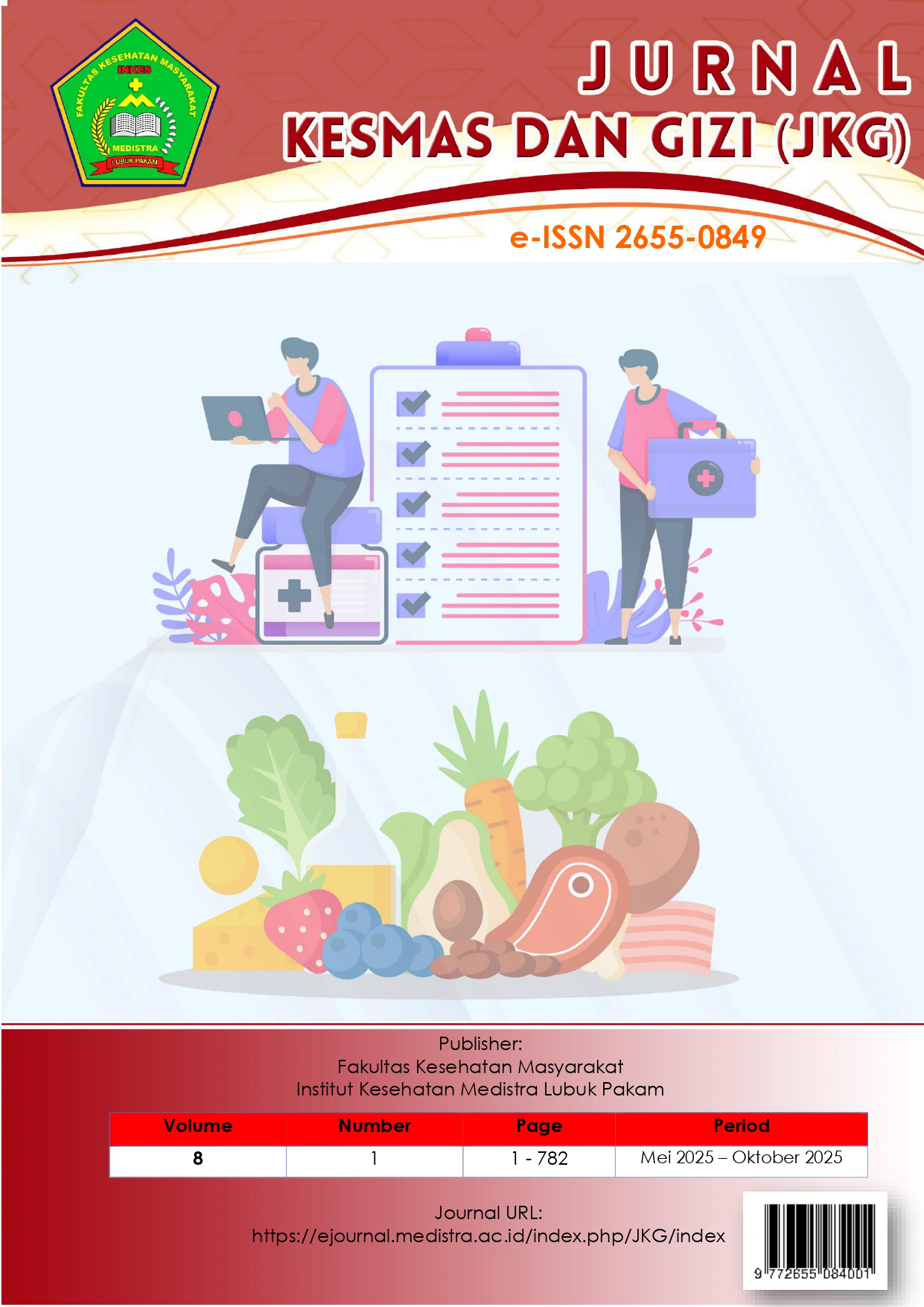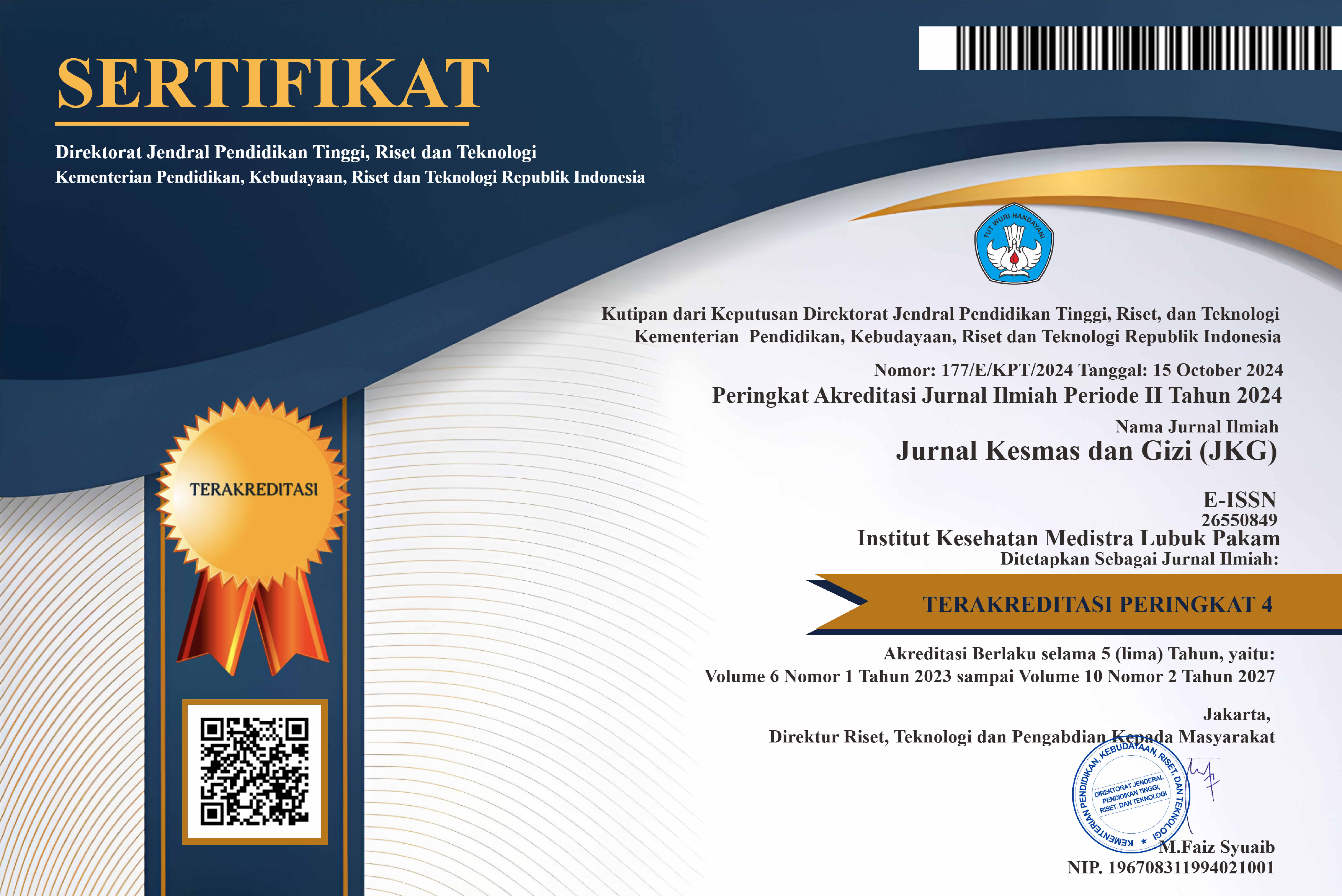The analysis of the factors influencing the awareness of post-operative neurosurgery patients in the ICU of a hospital
DOI:
https://doi.org/10.35451/xmqpxm81Keywords:
Knowledge, Attitude, Facility Availability, Team MonitoringAbstract
Background: The Intensive Care Unit (ICU) plays a crucial role in the care of post-surgical neurosurgery patients, as patients with critical conditions require close monitoring. The changes in the consciousness level of post-neurosurgery patients are influenced by various factors, including age, gender, Glasgow Coma Scale (GCS), family support, and teamwork among medical staff. Objective: This study aims to analyze the factors influencing the changes in the consciousness level of post-neurosurgery patients in the ICU of Grandmed Lubuk Pakam Hospital in 2024. Research Method: This study uses a cross-sectional design with primary data collection through observation and direct measurement. The sample consists of 40 post-surgical neurosurgery patients treated in the ICU of Grandmed Lubuk Pakam Hospital. Data were analyzed using univariate, bivariate, and multivariate analysis, employing chi-square tests and logistic regression. Results: The results show that factors such as age, gender, GCS, family support, and teamwork significantly influence the consciousness level of patients. The GCS factor (?8) has the most dominant effect, with an Odds Ratio (Exp(B)) = 5.523, indicating that patients with a low GCS have 5 times the risk of experiencing a decrease in consciousness compared to patients with a higher GCS. Conclusion: Factors such as age, gender, GCS, family support, and teamwork influence the changes in the consciousness level of post-neurosurgery patients. Monitoring GCS and strengthening teamwork, along with family support, can accelerate the recovery of patients' consciousness.
Downloads
References
[1] Kementerian Kesehatan Republik Indonesia. (2023). Peraturan Pemerintah Pengganti Undang-Undang No. 1778 Tahun 2023 tentang Pelayanan Kesehatan Berbasis Mutu dan Keselamatan Pasien.
[2] Smith, J., et al. (2021). Critical Care in Neurosurgery: Improving Outcomes Through Advanced Monitoring. Journal of Neurocritical Care, 18(2), 123-136.
[3] Permatasari, E., Lalenoh, D., & Rahardjo, S. (2017). Pulih Sadar Pascaanestesi yang Tertunda. J Neuroanestesi Indones, 6(3), 187–194.
[4] Smith, J., & Brown, A. (2021). Intensive care management of neurosurgical patients: A systematic review. J Crit Care Med, 36(5), 451-458.
[5] Kementerian Kesehatan Republik Indonesia. (2023). Layanan Bedah Saraf dan Penguatan Fasilitas Rumah Sakit. Available from: kemkes.go.id
[6] Green, R., & Taylor, S. (2018). Multidisciplinary team dynamics in critical care units. J Clin Health Sci, 21(5), 455-460.
[7] Brown, C., & Zhao, Y. (2022). Family-centered care in ICU settings: Benefits and challenges. Crit Care Fam Pract, 16(3), 200-207.
[8] Anderson, P., & Wong, K. (2020). Monitoring technologies in ICU for neurosurgical patients. Neurocrit Care J, 27(3), 189-196.
[9] Wulandari, N., et al. (2020). Pengaruh Faktor Internal dan Eksternal terhadap Tingkat Kesadaran Pasien Post-Operasi Bedah Saraf di ICU RSUP Dr. Sardjito. Jurnal Kesehatan, 24(2), 123-134.
[10] Rahman, A. (2021). Pemantauan Tingkat Kesadaran Pasien Pasca Operasi: Implikasi Klinis dan Prognosis. Jurnal Perawatan Intensif, 15(1), 35-42.
[11] Santoso, P., et al. (2019). Pengaruh Umur terhadap Kesadaran Pasien Post-Operasi Bedah Saraf di ICU. Jurnal Bedah Saraf, 17(3), 115-120.
[12] Pratama, M., et al. (2019). Pengaruh Faktor Umur dan Jenis Kelamin terhadap Tingkat Kesadaran Pasien Post Operasi Bedah Saraf. Jurnal Neuroanestesiologi, 11(4), 233-240.
[13] Putri, N., & Harahap, S. (2022). Pengaruh Umur terhadap Komplikasi Pasca Bedah Saraf: Implikasi terhadap Kesadaran Pasien. Jurnal Kesehatan Umum, 31(1), 45-52.
[14] Fitriani, D. (2018). Pengaruh Jenis Kelamin terhadap Perubahan Status Neurologis Pascaoperasi Bedah Saraf. Jurnal Kedokteran Indonesia, 8(2), 78-84.
[15] Sari, H., & Hidayat, T. (2021). Perbedaan Pola Respons Imun dan Inflamasi antara Laki-Laki dan Perempuan pada Pasien Bedah Saraf. Jurnal Imunologi Klinis, 7(1), 15-22.
[16] Dewi, A., & Yulianti, R. (2017). Hubungan Skor GCS dengan Kesadaran Pasien Post-Operasi Bedah Saraf di ICU. Jurnal Bedah & Anestesi, 14(3), 201-210.
[17] Purnama, S., et al. (2021). Hubungan GCS Pre- dan Post-Operasi dengan Kesadaran Pasien Bedah Saraf. Jurnal Neuroklinik, 19(2), 101-107.
[18] Prasetyo, E., et al. (2019). Pengaruh Dukungan Keluarga terhadap Tingkat Kesadaran Pasien Post Operasi Bedah Saraf. Jurnal Kesehatan Masyarakat, 23(4), 256-263.
[19] Susanti, D., et al. (2020). Pengaruh Kerja Sama Tim terhadap Pemulihan Pasien Post-Operasi Bedah Saraf di ICU. Jurnal Keperawatan Intensif, 25(2), 119-126.
[20] Handayani, L., & Sari, R. (2018). Komunikasi Efektif Tim Medis ICU dan Dampaknya terhadap Kesadaran Pasien. Jurnal Keperawatan Klinis, 22(3), 101-108.
[21] Putra, M., & Dewi, S. (2019). Kerja Sama Tim ICU dan Waktu Pemulihan Kesadaran Pasien Bedah Saraf. Jurnal Bedah & Anestesi, 16(4), 175-180.
[22] Rahman, A., et al. (2020). Pengaruh Kerja Sama Tim dalam Penanganan Komplikasi Neurologis Pasien Bedah Saraf. Jurnal Neuroanestesiologi Indonesia, 13(1), 45-52.
[23] Nugroho, E., et al. (2023). Peran Tim Medis dalam Meningkatkan Pemulihan Neurologis Pasien Post-Operasi Bedah Saraf. Jurnal Keperawatan Saraf, 14(2), 77-83.
Downloads
Published
Issue
Section
License
Copyright (c) 2025 Margaretha N.C Sitanggang, Reni Aprinawaty Sirait, Delita Br. Panjaitan

This work is licensed under a Creative Commons Attribution 4.0 International License.
Copyright in each article is the property of the Author.



























